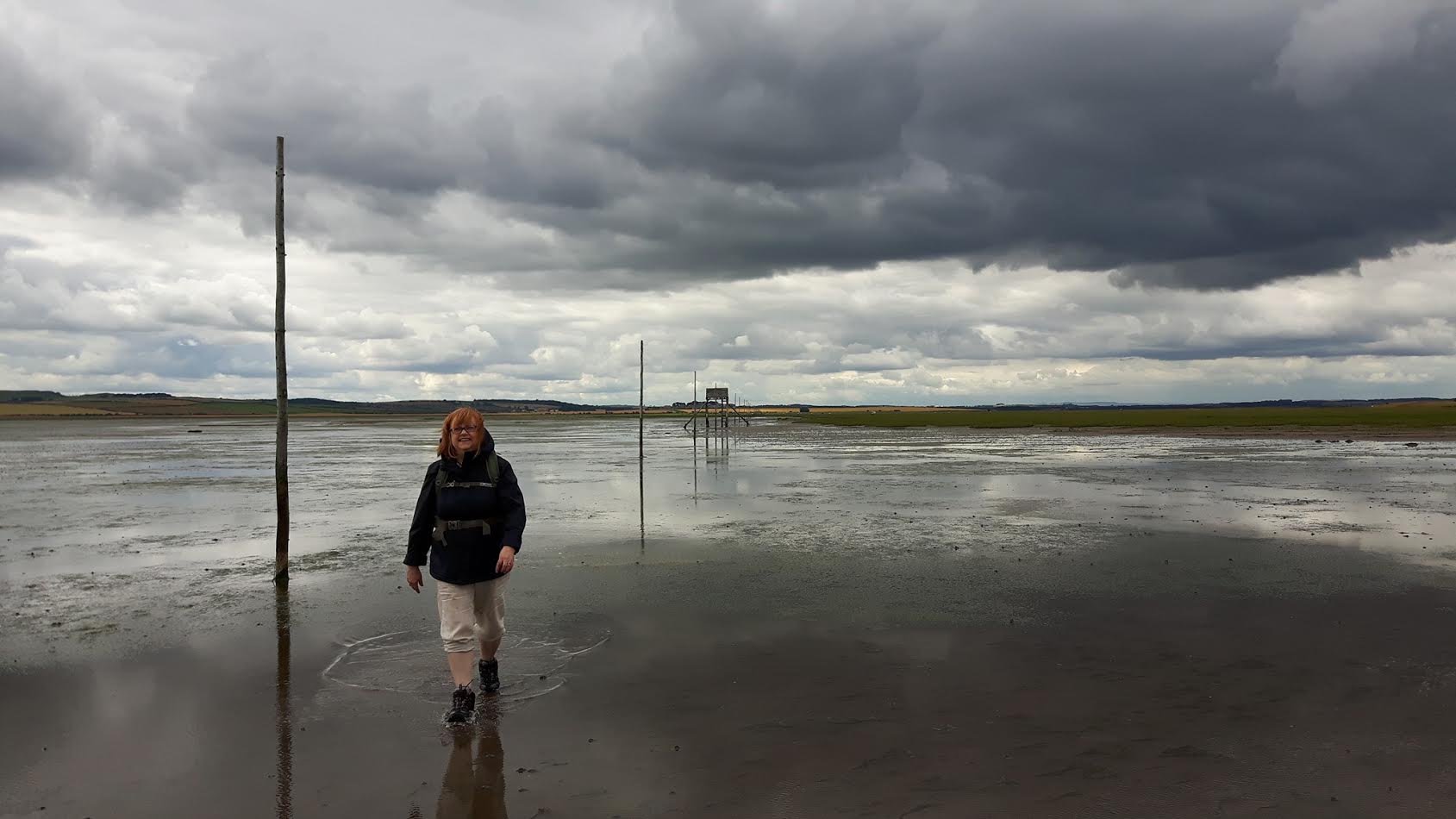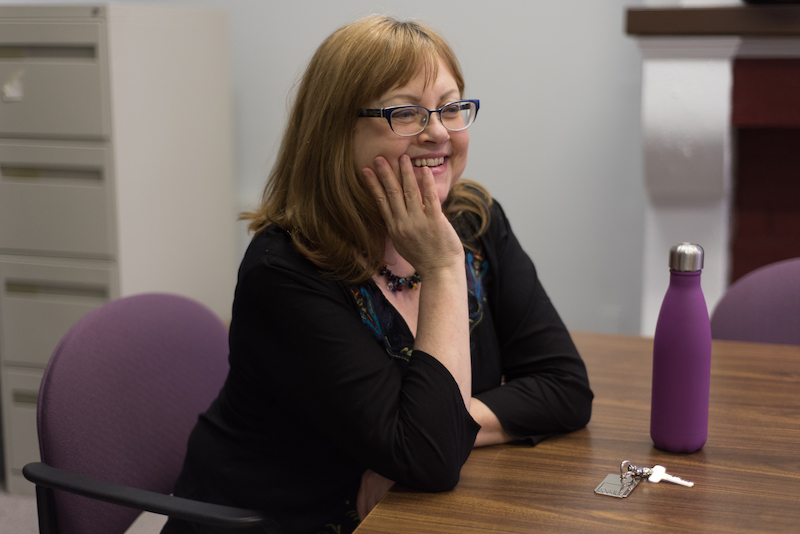A pilgrimage through the life of a part-time professor
As I enter the room where I will be interviewing part-time faculty member Sara Terreault, I can’t help but notice how strikingly different the rooms in the theological studies department look compared to other departments on campus.
The paintings on the walls and the many books on the shelves seem to mirror Terreault’s life, while the room’s beautiful wooden furnishings give a rich perspective of theology in contrast to the sterility sometimes prevalent in modern academia.
“God, the G-word—a naughty word in academia—you’re allowed to use it here and take it seriously and understand both historically and in contemporary contexts what that means for people,” Terreault said.
Terreault is a professor of theology and Irish studies. She has taught eleven different theology courses at Concordia, including a class on Celtic Christianity.
“I think something that distinguishes theology and makes it very rich and attractive to a lot of students is that we ask those existential questions while allowing a horizon of transcendence,” Terreault explained. “You’re allowed to ask questions that include ultimate questions.”
Terreault had not envisioned herself teaching theology when she was younger. Despite her Christian upbringing and lifelong involvement with the Church, Terreault initially planned to be an artist.
From the age of 13 to 19, Terreault apprenticed with painter Helmut Gerth, focusing primarily on watercolours. “I convinced my mom to get me these private art lessons, and I just took to it like a duck to water,” she said.
From there, Terreault enrolled in Dawson’s Studio Arts program, where she was able to practice studio art, including painting and sculpting. However, Terreault eventually pursued art history at Concordia—a decision influenced by her travels and year living in the UK. “I went to Europe and saw lots of art and loved it,” she said. “So when it came time to pick a major, I picked art history.”
Though spirituality and Christianity had been important parts of Terreault’s life, she became distant from this aspect of her identity when she started her undergraduate degree.
“At that time, religious things were, in that academic environment, uncool—and the worst of all was Christianity,” Terreault said. “I towed the fashionable line and sort of let that all go.”
But spirituality was never far from Terreault’s mind, she said, even if she wasn’t actively thinking about it. “I did a lot of literature and classics for electives,” she said. “They were all sort of sideways, backdoor ways of getting at that same sort of [theological] area.”
Terreault moved to California in 1988 when her husband was offered a job there. She lived there for seven years, working as a stay-at-home mother for her two boys and running an in-home daycare part-time.
Terreault had a moment of spiritual clarity when she gave birth to her first child. “Having kids really helps you start thinking about what really matters, and I guess I just got the balls to say [spirituality] is what I really care about,” she said.
After being out of school 10 years, Terreault decided to move back to Montreal to complete her undergraduate art history degree and to pursue her graduate degree in theology at Concordia. She is now a part-time professor there, teaching on average one to two courses per semester.
Her favourite course to teach, she said, is THEO 234 Pilgrim Bodies, Sacred Journeys, which allows students to undertake personal pilgrimages or participate in an organized class pilgrimage. She has travelled with students to the Camino de Santiago de Compostella in Spain, across Ireland, and to the Kahnawà:ke Mohawk reservation to explore both Christian and Mohawk traditions of spirituality.
Terreault has undertaken many personal pilgrimages as well, particularly around Ireland and the UK. Her favourite pilgrimage, she said, was one she made to Iona in Scotland.
“I’m interested in those early Celtic saints—their lives and their wishes and dreams and values,” she said. “I really feel like there’s a kind of communion with them when I’m in places that they were in, or where they’re buried, or where others have walked towards them.”
Most of the pilgrimages Terreault does are on foot, though she said this does not have to be the case for everyone. “For some people, the journey is the whole thing. For other people, the end point is the whole thing—they might fly as close to their destination as possible and then take a car,” she said. “I would say, for me, it’s both.”

“There’s a lot that goes on when you walk long distances in a sustained way over days upon days. Physiologically, it changes the body. Psychologically, it slows you down,” Terreault said. “In a walking pilgrimage, the journey becomes part of the point, and it provokes existential questions and reflection.”
Teaching, and her ability to engage with students, she said, is what she is most proud of. “They are just wonderful people to hang out with, and when you get a sense that you’ve contributed something valuable to them, that’s pretty darn fulfilling.”
However, being a part-time professor has been challenging for Terreault. The hardest part, for her, is the lack of recognition and funding. “Funding, if you’re part-time, is a lot harder to get for research,” she said.
But the Concordia University Part-Time Faculty Association (CUPFA), she said, has been a saviour with regards to her research. “CUPFA has simply been a lifeline in terms of allowing me to do research in these ancient pilgrimage places,” Terreault said. “They’re completely supportive of research, and there’s not much help for that elsewhere in the university unfortunately.”
However, Terreault still struggles. There are semesters when she is given no classes to teach at all. “It’s a small department, and courses have been cut over the last few years with budget cuts, so there are fewer offerings,” she said. “I would certainly love to teach more, but sometimes the courses just aren’t available.”
During these times, she said, finances can be a struggle. “Food bills and mortgage payments and things like that, you’ve got to meet them.” Though she’s thought about getting another job, she has no real plans to do so.
“This is what I love to do,” she said. “I’ve been lucky that I’ve been able to get enough that it keeps me going.”
The classes she teaches now attract a very diverse group of students—and that’s how she likes it. “If theology is about what it means to be human in all dimensions, then all the different disciplines have something to say to that question,” she said.
Terreault works hard to welcome and incorporate all students’ experiences and value orientations into her classroom, whether they are religious or not. “I invite students to bring their experience and understanding into the conversation. You don’t check your beliefs at the door—you bring them in and learn how to look at them critically and in a historical context or cultural context,” she said.
Terreault says her classes are widely popular. Interest in theology, she said, has become less taboo since her university experience in the 80s. Any given class she teaches will include students from many different departments.
“I would say it’s spread pretty evenly across the disciplines,” she said. “I think they find that balance between intellectual orientation and that sort of holistic orientation of theology which speaks to them in some way that’s valuable.”
Terreault said she always tries to bring her curiosity and care to the classroom. “I care about learning and I care about the students. I love them. I think I’m pretty open-minded, but at the same time, a pretty disciplined thinker.”
Outside of her Concordia classes, Terreault has worked as a spiritual and community animator for the English Montreal School Board. In this capacity, she helped students tackle spiritual and existential questions, and incorporated each student’s spiritual and religious beliefs into counseling.
Unlike psychological counseling, which focuses solely on the individual, spiritual animation, she explained, focuses on students’ well-being in a wider community context. At the same time, it gives students the space to think about life’s big questions and what they mean to them.
“Some of my students, I would meditate with them. For some of them, they may want to pray,” she said. “It may, for some, have a religious component. For others it may not. And it’s also a way to give them a space to sort of think about and act on those questions and concerns, and also a way of getting them involved in community action.”

One year, Terreault’s students put on a music concert and invited a retirement community to come watch. She says activities like this help grow students’ combined spiritual, personal and community identity.
Terreault said her work as an animator allowed her to work with students from a variety of backgrounds, from Judeo-Christian students, to Muslim students, to Sikh students and even irreligious students. “The school I worked in was complete diversityland,” she said about her work at Holy Cross Elementary. “It was a wonderful, wonderful environment.”
Outside of teaching, Terreault enjoys gardening, travelling and going to art museums. “I still love my art history,” she said. “There’s something about that combination of art and theology.”
Although it’s been awhile since Terreault has painted seriously, she said she hopes to get back into it in the future. “[My eldest son] has sort of gotten interested in painting, so he and I are thinking of setting up a little studio in the basement chez nous, and he’ll come over and we’ll do some painting together,” she said.
Still, spirituality plays a big role in her personal life. Terreault attends Church and engages in what she calls “classical practices revamped to fit [her] lifestyle,” such as meditation and fasting.
She said most of the things in her life are guided by spirituality. “I consider a lot of the things I do, both in the classroom and outside, spiritual,” Terreault said.
“Teaching and learning and connecting with students and discussion is really spiritually important to me,” she explained. “The same goes with engagement with art and gardening and getting your hands into the earth—that whole generative, beautiful thing about gardening—I think it’s all pretty spiritual for me.”




